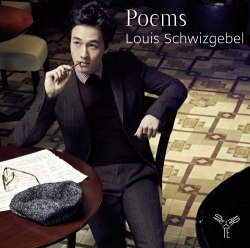| 
|
Poems
Maurice RAVEL (1875-1937)
Gaspard de la Nuit: trois poèmes pour piano d’après Aloysius Bertrand (1908)
1. Ondine [6:42]
2. Le gibet [5:44]
3. Scarbo [9:08]
Franz LISZT (1811-1886)
4. La vallée d’Obermann [12:49]
Heinz HOLLIGER (b. 1939)
Elis, Drei Nachtstücke für Klavier
5. Elis, wenn die Amsel im schwarzen Wald ruft, Dieses ist dein Untergang [1:26]
6. Blaue Tauben, Trinken nachts den eisigen Schweiß, Der von Elis' kristallener [1:48]
7. Ein goldener Kahn, Schaukelt, Elis, dein Herz am einsamen Himmel [2:10]
Franz SCHUBERT (1797-1828) (arr. Liszt)
8. Ständchen [5 :20]
9. Auf dem Wasser zu singen [3:52]
10. Du bist die Ruh [4:57]
11. Erlkönig [4:26]
Louis Schwizgebel (piano)
rec. 1-3 April 2013, Radio de Zürich, Studio 1, Switzerland
APARTÉ AP067 [58:00]
A piano recital unified by poetry-inspired pieces is a tried and tested formula but the programme still needs to be well-chosen and balanced. Here, the source material features Romanticism in various guises: moody, gothic and a more domestic variety. Add to this songs inhabiting the more lurid Expressionism. The music provides similar variety; the only thing I would question is starting with Gaspard, after which the relatively dull harmonic language of Liszt is - for me at least - a bit of a let-down.
Louis Schwizgebel won second prize at the 2012 Leeds International Piano Competition and is now a BBC New Generation Artist. Judging by the playing on this CD, these honours are well deserved. Schwizgebel has a very fine technique with a fleetness of finger and controlled power that enables him to negotiate the delicate filigree of Ondine and the thundering octaves of La vallée d’Obermann with equal clarity. With superbly varied articulation, he matches the sharpness and bite that Benjamin Grosvenor on his Decca recording brings to Scarbo.Le Gibet, in some ways the most difficult component of Gaspard de la Nuit,is presented with an acute sense of desolation and stasis, even at its relatively fast tempo.
I sometimes wonder what Liszt would have made of Ravel’s toweringly difficult masterpiece. My guess is that the professional in him would have got on with learning the notes. His marvellous imagination would have resulted in a spectacular performance, just as he was able to cause Chopin - a composer with a very different harmonic language - to want to “rob him of his way of playing my etudes”. In La vallée d’Obermann, Schwizgebel brings out well the melancholy and desperation of the hero of Senancour’s novel.
In ‘The Romantic Generation’, Charles Rosen, discussing Liszt’s arrangement of Schubert’s Der Lindenbaum, wrote; “To comprehend Liszt’s greatness one needs a suspension of distaste, a momentary renunciation of musical scruples … it is, unfortunately useless to try to separate the great musician from the charlatan: each needed the other in order to exist”. Der Lindenbaum is an extreme example of Liszt’s song arrangements but Rosen’s comments apply just as well to the four on this disc. It is true that the ‘product’ was designed to thrill and impress an audience hungry for pianistic pyrotechnics. At the same time, one must remember Liszt’s well-documented understanding of, and genuine love for, Schubert’s songs. The poetic originals survive the technical tricks, and here only a few un-Schubertian fortissimi mar the atmosphere, though this pianist is never too heavy.
Schwizgebel integrates the dual inputs very well, his versions lacking only the last ounce of sensitivity that Murray Perahia brought to three of the arrangements on his disc of Impromptus. Liszt’s characterisation of the three voices of Erlkönig is ideally delineated by Schwizgebel who does a good job for both composers.
The Elis, Drei Nachtstücke für Klavier are, because of their relative rarity, a highlight of this disc. Written while still a student in 1961 and revised in 1966, Holliger’s three nocturnes are based on poems by the Austrian Expressionist Georg Trakl (1887-1914) (text). With not a note wasted, they are short but striking examples of expressionism in music and repay repeated listening. Since their first outing on an all-Holliger disc in 1998, they have been recorded three times. The fine versions by Heidrun Holtmann and Gilles Vonsattel, both of whom also include Gaspard de la Nuit in their programmes are equalled by that of Schwizgebel.
In sum, this is a very good recital. I could live with any of the performances. It is good to see another version of the Holliger pieces. As for the Gaspard de la Nuit, it is one of the finest available. I look forward to hearing more of Louis Schwizgebel.
Roger Blackburn
 |
 |
|



 All Nimbus reviews
All Nimbus reviews








